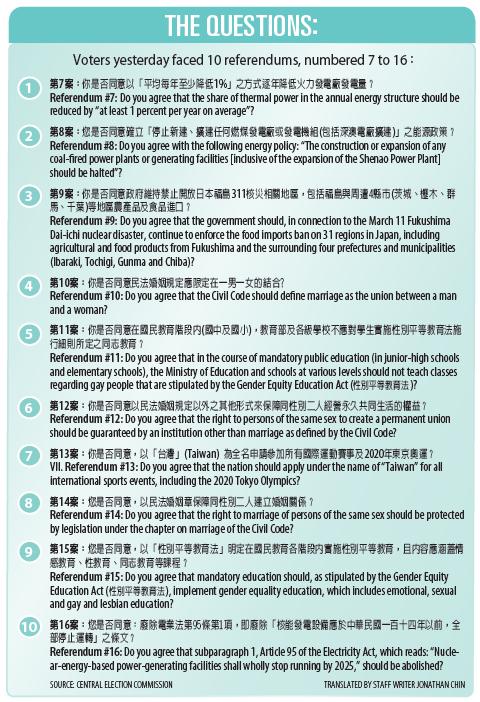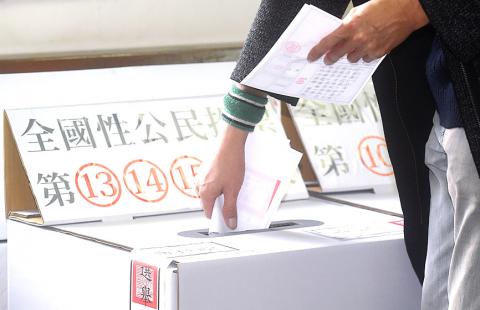Except for one, the 10 referendums held yesterday would be little more than a NT$1.5 billion (US$48.54 million) survey, as nine would not be legally binding on the government if they passed, attorney Lu Chiou-yuan (呂秋遠) said on Friday.
“If they pass, the government would consider them. If they fail to pass, that would not mean the government would not consider them,” he posted on Facebook.
The exception is Referendum No. 16, which asks people about overturning the policy to phase out nuclear energy by 2025, because it asks whether voters agree to abrogate Article 95-1 of the Electricity Act (電業法), meaning the article would be nullified if the plebiscite is passed, he wrote.

GRAPHIC: TT
The other nine would not impose any legal liability on the government if it refused to act on the results, as that would only cost it political credibility, he wrote.
“Therefore, make your choices wisely and tell the government what you think, but do not be overly worried, all they amount to is a NT$1.5 billion survey,” he wrote.
Yet “even with their high cost, I think they are priceless,” he wrote. “At least we get to express our opinions and engage in discussions with our family, friends and even strangers before making decisions.”

Photo: Liao Chen-huei, Taipei Times
“This is the best thing anyone could ask for in the making of a sensible citizen,” he wrote.
The referendums, which he described as “a general IQ test” and survey, would also reflect people’s values and way of thinking when faced with controversial issues, Lu wrote, adding that independent thinking is the most significant aspect of a referendum.

A Taiwanese software developer has created a generative artificial intelligence (AI) model to help people use AI without exposing sensitive data, project head Huang Chung-hsiao (黃崇校) said yesterday. Huang, a 55-year-old coder leading a US-based team, said that concerns over data privacy and security in popular generative AIs such as ChatGPT and DeepSeek motivated him to develop a personal AI assistant named “Mei.” One of the biggest security flaws with cloud-based algorithms is that users are required to hand over personal information to access the service, giving developers the opportunity to mine user data, he said. For this reason, many government agencies and

The National Fire Agency on Thursday said a series of drills simulating a magnitude 8.5 earthquake would be held in September to enhance the government’s emergency response capabilities. Since earthquakes cannot be predicted, only by continuously promoting disaster prevention measures could Taiwan enhance its resilience to earthquakes, agency Director-General Hsiao Huan-chang (蕭煥章) said in a news release. The exercises would be held to mark annual National Disaster Prevention Day on Sept. 21, the aim of which is to test Taiwan’s preparedness and improve its earthquake resilience in case of a major temblor, Hsiao said. As part of those drills, an earthquake alert would

DEFENSE: The National Security Bureau promised to expand communication and intelligence cooperation with global partners and enhance its strategic analytical skills China has not only increased military exercises and “gray zone” tactics against Taiwan this year, but also continues to recruit military personnel for espionage, the National Security Bureau (NSB) said yesterday in a report to the Legislative Yuan. The bureau submitted the report ahead of NSB Director-General Tsai Ming-yen’s (蔡明彥) appearance before the Foreign and National Defense Committee today. Last year, the Chinese People’s Liberation Army (PLA) conducted “Joint Sword-2024A and B” military exercises targeting Taiwan and carried out 40 combat readiness patrols, the bureau said. In addition, Chinese military aircraft entered Taiwan’s airspace 3,070 times last year, up about

STRICTER ENFORCEMENT: Taipei authorities warned against drunk cycling after a sharp rise in riding under the influence, urging greater public awareness of its illegality Taipei authorities have issued a public warning urging people not to ride bicycles after consuming alcohol, following a sharp rise in riding under the influence (DUI) cases involving bicycles. Five hundred and seven people were charged with DUI last year while riding YouBikes, personal bicycles, or other self-propelled two-wheelers — a fourfold increase from the previous year, data released by the Taipei Police Department’s Traffic Division showed. Of these, 33 cases were considered severe enough to be prosecuted under “offenses against public safety,” the data showed. Under the Road Traffic Management and Penalty Act (道路交通管理處罰條例), bicycles — including YouBikes and other